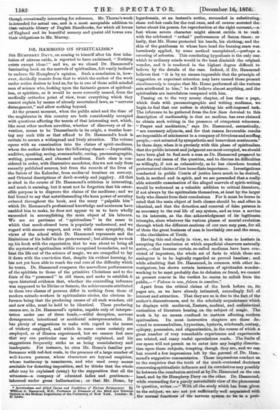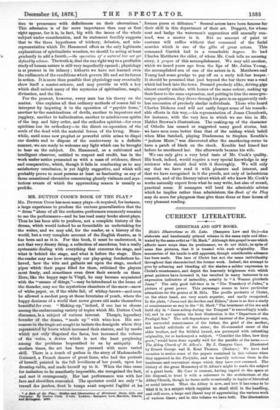DR. HAMMOND ON SPIRITUALISM.*
Stu HUMPHREY DAVY, on coming to himself after his first inha- lation of nitrous oxide, is reported to have exclaimed, "Nothing. exists except ideas ! " and we, as we closed Dr. Hammond's fascinating book on the marvels of spiritualism, felt vastly inclined to endorse Sir Humphrey's opinion. Such a conclusion is, how- ever, decidedly remote from that to which the author of the work under notice desires to lead us, for he is one of those solid-minded men of science who, looking upon the fantastic games of spiritual- ism, or spiritism, as it would be more correctly named, from the medically orthodox point of view, treat everything which they cannot explain by means of already ascertained laws, as "nervous derangement," and allow nothing beyond.
At the present moment, when the public mind and the time of the magistrates in this country are both considerably occupied with questions affecting the tenets of that interesting sect, which, like most other modem novelties, whether of discovery or of in- vention, seems to be Transatlantic in its origin, a treatise bear- ing any such title as that affixed to Dr. Hammond's book is certain to secure a widespread and lively attention. The volume opens with an examination into the claims of spirit-mediums, whom the author divides into the-following classes :—Impressible, auditive, speaking, seeing, somnambulic, curing, pneumatographic, writing, possessed, and obsessed mediums. Each class is con- aidered in order, with illustrative anecdotes, drawn not only from recently published sources, but from the records of the lives of the Saints of the Kalendar, from mediaeval treatises on sore cry, and Oriental descriptions of devil-worship and jugglery. All that is cited in the course of 'Dr. Hammond's criticism is interesting, and much is amusing, but it must not be forgotten that his osten- sible purpose is to disprove the claims of the mediums ; and we feel bound to say that notwithstanding the keen power of scrutiny evinced throughout the book, and the many "palpable hits" which Dr. Hammond's professional knowledge and acuteness have enabled him to make, he does not appear to us to have wholly -succeeded in accomplishing the main object of his labours. We are no partisans of. " spiritualism " in the sense in which that much-abused term is popularly understood, and we regard with sincere respect, and even with some sympathy, the views of the school which Dr. Hammond represents and the limitations of his belief in the preternatural ; but although we took up his book with the expectation that he was about to bring all the mysteries of spiritualism within recognised boundaries, and to beat the life out of the science of magic, we are compelled to lay it down with the conviction that, despite his evident learning, he bus not yet been able to reach the real core of the difficulty which lie treats. Dr. Hammond compares the marvellous performances the-spiritista to those of the primitive Christians and to the feats of the "possessed" in old times, and seeks to establish it upon historical evidence that, whether the controlling influence was stipposed to be Divine or Satanic, the achievements attributed to these two classes of persons differ in nothing from those of modern miracle-workers in spiritualistic circles, the obvious in- ference being that the producing causes of all such wonders, old and new alike, must be held to be identicaL These producing causes are, in Dr. Hammond's opinion, capable only of interpre- tation under one of three heads,—wilful deception, nervous derangement, intentional or accidental misrepresentation. He has plenty of suggestions to make with regard to the means of trickery employed, and which in some cases certainly are employed, or of illusion experienced, but we cannot feel sure that any one particular case is actually explained, and his auggestions frequently strike us as being unsatisfactory and inadequate. For instance, he cites Mr. Home's familiar per- formance with red-hot coals, in the presence of a large number of well-known persons, whose characters are beyond suspicion, whose testimony is unanimous, and who used every means available for detecting imposition, and he thinks that the whole affair may be explained (away) by the supposition that all the witnesses—a company of educated ladies and gentlemen— laboured under gross hallucination ; or that Mr. Home, by * spiritualism. and Allied Callao and Condition,' of Norrout Derangement. By "William A. Hammond. M.D., Professor of Diseases of the Mind and Nervous System in the Medical Department of the University of New York. London: H. K Lewis. legerdemain, at an instant's notice, succeeded in substituting sham red-hot coals for the real ones, and of course secreted the latter about his person for reproduction at the right moment,—a feat whose severe character might almost entitle it to rank with the celebrated "ordeal" performances of Saxon times ; or lastly, that Mr. Home protected his hands, his clothing, and the skin of the gentleman to whose bare head the burning mass was harmlessly applied, by some method unexplained,—perhaps a covering of asbestos. This concluding hypothesis is the only one which to ordinary minds would in the least diminish the original wonder, and it is rendered in the highest degree difficult to believe by the details of the case. Indeed, if Dr. Hammond believes that "it is by no means impossible that the principle of suggestion or expectant attention may have caused those present simultaneously to imagine that Mr. Home performed all the various acts attributed to him," he will believe almost anything, and the spiritualists are incredulous compared with him.
Passing on to the very scanty chapter, of less than a page, which deals with pneumotographic and writing mediums, we begin to feel that our author is shirking his self-impoaed task. The inference to be gathered from thelew lines devoted to this description of mediumship is that no medium has ever claimed to obtain such writing in the presence of competent witnesses. "Prayer, and meditation," says Dr Hammond, sarcastically, "are necessary adjuncts, and for that reason favourable results are impossible of attainment in a company of frivolous and scoffing people,—not actuated by sympathetic and benevolent sentiments." In these days, when it is precisely with this phase of spiritualism thatthe public interest and judgment are most occupied, we should have been glad to find such a man as Dr. Hammond prepared to meet the real issues of the question, and to discuss its difficulties as willingly, if not as exhaustively, as be has elsewhere treated preternatural claims of less immediate importance. Investigations conducted in public Courts of justice leave much to be desired, both in method and in spirit, and we are persuaded that a really able scientific examination of the alleged marvels of spirit-writing, would be welcomed as a valuable addition to critical literature, if not always by the spiritualists themselves, at least by the larger body who dissent from their conclusions. For it must be borne in mind that the main object of both classes should be and often is identical, and that the detection and removal of false persons is as necessary to the real life of any system, and as true a service to its interests, as the due . acknowledgment of its legitimate triumphs, since whatever the various phases of mental evolution through which the different sections of our race may pass, for all of them the great business of man is inevitably one and the same, —the elucidation of Truth.
Having this end clearly in view, we feel it wise to hesitate in accepting the conclusion at which superficial observers naturally arrive,—that because certain so-called mediums have been con- victed of imposture, the whole set of facts to which these are analogous is to be logically regarded as proved baseless ; and while admitting that Dr. Hammond, in common with other in- vestigators, has shown certain instances of spiritualist wonder- working to be most probably due to delusion or fraud, we cannot at present concur in the verdict he seems to solicit from the public,—" Falsum in uno, falsum in omnibus."
Apart from the critical claims of the book before us, its pages are, as we have already intimated, exceedingly full of interest and attraction. That they are so is due to the fact of the author's discursiveness, and to the scholarly acquaintance which he displays with medimval, Eastern, medical, and ecclesiastical curiosities of literature bearing on the subject of magic. The work is by no means confined to matters affecting modem spiritualism. Its most instructive chapters are those de- voted to somnambulism, hypnotism, hysteria, witchcraft, ecstasy, epilepsy, possession, and stigmatisation, in the course of which a great number of very remarkable experiences and experiments are related, and many useful speculations made. The limits of our space will not permit us to enter into any lengthy disserta- tion upon these subjects, tempting though they are, and we can but record a few impressions left by the perusal of Dr. Ham- mond's suggestive commentaries. Those impressions conduct us to the suspicion that the truth of the much-contested doctrines concerning spiritualistic influence and its correlatives may possibly lie between the conclusion arrived at by Dr. Hammond on the one hand, and by Sir Humphrey Davy on the other. Dr. Hammond, while contending for a purely materialistic view of the phenomena in question, writes :—" With all the study which has been given to the subject, we are not yet sufficiently well acquainted with the normal functions of the nervous system to be in a posi- tion to pronounce with definiteness on their aberrations." This admission is of far more importance than may at first sight appear, for it is, in fact, big with the issues of the whole subject under consideration, and its statement forcibly suggests -that to the three hypotheses of trickery, delusion, and mis- representation which Dr. Hammond offers as the only legitimate explanations of spiritualistic wonders, we should he acting at least prudently to add a fourth,—the operation of a natural law not yet definedby science. The truth is, that the one right way to a profitable study of human nature is still very imperfectly opened; physiology is at present in its infancy ; hitherto we have not learned even the rudiments of the conditions which govern life and set its forces in action. It is more than possible that physiology may eventually show itself a master-science, and may provide us with a key which shall unlock many of the mysteries of spiritualism, magic, divination, and the like.
For the present, however, every man has his theory on the matter. One explains all that ordinary methods of reason fail to interpret by imputing it to the operation of "psychic force," another to-the machinations of devils, another to imposture and jugglery, another to hallucination, another to mischievous spirits of the imp and fairy order, and the orthodox spiritist—for even spiritism has its orthodoxy—to the direct co-operation of the souls of the dead with the material forces of the living. Mean- while, until some new prophet or powerful critic arises to dispel our doubts and to dispose of the controversy in a definite manner, we are ready to welcome any light which can be brought to bear on the subject. Dr. Hammond, as a cultivated and intelligent observer, entitled to respect and credit, has in the work under notice presented us with a mass of evidence, direct and comparative, which, though it fails in conducting us to any satisfactory conclusion, is yet highly suggestive, and which will probably prove to most persons at least as fascinating as any of those sensational chronicles concerning ghostly visitants and mys- terious events of which the approaching season is usually so prolific.



































 Previous page
Previous page